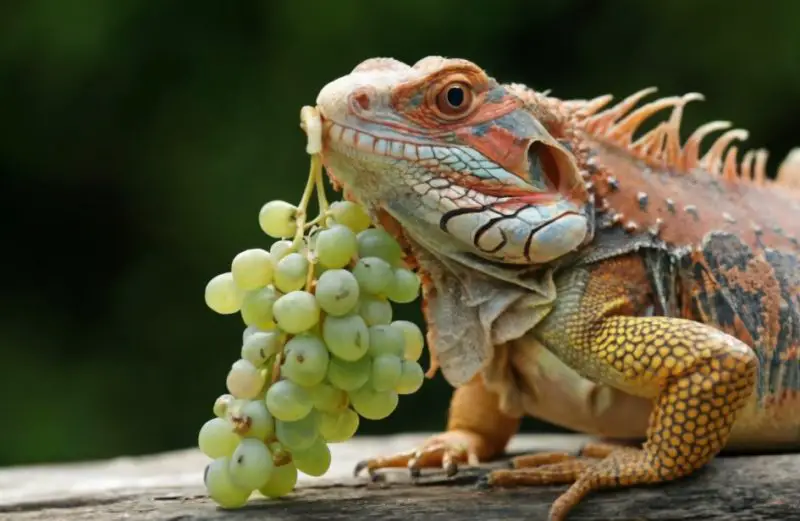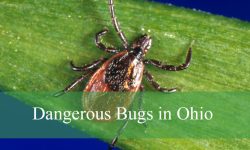Bearded dragons, known for their docile nature and unique appearance, have become a popular pet among reptile enthusiasts. These exotic creatures are omnivores, meaning they eat a combination of plant-based foods and animal-based proteins.
However, when it comes to feeding your bearded dragon, not all fruits are equally beneficial or safe. One of the most commonly asked questions by new bearded dragon owners is whether grapes are safe for their pets.
This comprehensive guide will address that question in detail, looking at the potential benefits, risks, and the proper way to include grapes in your bearded dragon’s diet.
Can Bearded Dragons Eat Grapes?

Bearded dragons can eat grapes, but they should be offered in moderation. Grapes, like many other fruits, are not a staple part of their diet. They can be an occasional treat that provides some nutritional benefits, but there are also several risks associated with feeding them too often. Understanding these factors is crucial in determining how grapes can fit into a balanced diet for your bearded dragon.
Nutritional Value of Grapes
Grapes are a rich source of various nutrients, but not all of them align with the dietary needs of bearded dragons. It’s important to look at the nutritional breakdown of grapes to understand what your pet may be getting from this fruit.
Vitamins and Minerals
Grapes contain several important vitamins and minerals that can benefit your bearded dragon in small quantities. Some of the key vitamins and minerals found in grapes include:
- Vitamin C: Grapes are a good source of vitamin C, an essential nutrient that helps maintain a healthy immune system and supports the overall health of your bearded dragon. Vitamin C also plays a role in the absorption of iron and helps with the healing of wounds.
- Vitamin K: This vitamin is important for blood clotting and bone health. While your bearded dragon can get vitamin K from other sources, it is still beneficial to provide some additional intake through grapes in moderation.
- Vitamin B6: This vitamin plays a role in brain function, metabolism, and immune system function. Grapes provide a modest amount of vitamin B6 that can contribute to your bearded dragon’s overall health.
- Potassium: Potassium is essential for proper muscle function, nerve impulses, and fluid balance in the body. Grapes can contribute a small amount of potassium to your dragon’s diet, which is important for their daily nutritional intake.
Antioxidants
Grapes are also rich in antioxidants, specifically flavonoids, which help to combat oxidative stress in the body. Antioxidants are vital for reducing inflammation and preventing cellular damage caused by free radicals. Although bearded dragons do not require large amounts of antioxidants, small amounts from grapes can contribute to overall health and immune function.
Fiber
Fiber is essential for healthy digestion, and grapes provide a moderate amount. The fiber in grapes helps to support the digestive system, ensuring that your bearded dragon’s food moves through their intestines properly. However, too much fiber can lead to digestive issues, so grapes should never be the primary source of fiber in their diet.
Natural Sugars
Grapes are high in natural sugars, mainly fructose. While sugars are not inherently bad for bearded dragons, excessive sugar intake can lead to obesity, metabolic disorders, and other health problems. Bearded dragons have a slow metabolism, and their bodies are not designed to handle large amounts of sugar. Therefore, grapes should be given sparingly and not as a regular part of their diet.
Health Risks of Feeding Grapes to Bearded Dragons
While grapes offer some nutritional value, there are also several potential health risks that bearded dragon owners should be aware of before including them in their pets’ diets.
High Sugar Content
The most significant concern when feeding grapes to bearded dragons is their high sugar content. Bearded dragons have relatively low metabolic rates compared to mammals, meaning their bodies do not process sugar as efficiently. Overfeeding sugary fruits like grapes can lead to weight gain, obesity, and even diabetes over time. To avoid these issues, grapes should only be fed occasionally and in small quantities.
Kidney Damage
There has been some concern among reptile experts regarding the potential for grapes to cause kidney damage in certain reptiles, including bearded dragons. While scientific studies specifically linking grapes to kidney failure in bearded dragons are scarce, it’s better to be cautious. Grapes contain compounds that may place stress on the kidneys if consumed in large quantities. Since kidney damage can be difficult to detect until it’s severe, it’s best to avoid excessive feeding of grapes to minimize this potential risk.
Choking Hazard
Another important consideration when feeding grapes to your bearded dragon is the risk of choking. Grapes are small, round, and can easily become lodged in your dragon’s throat if they are not properly prepared. To reduce the risk of choking, always cut grapes into smaller, bite-sized pieces. This ensures that your bearded dragon can easily chew and swallow them without difficulty.
Pesticides and Chemicals
If you purchase grapes from a store, they may be treated with pesticides or chemicals to prolong their shelf life. These substances can be harmful to your bearded dragon if consumed. Even if you wash the grapes thoroughly, there may still be residue left behind. It’s a good idea to opt for organic grapes or ensure that you wash the fruit well to remove any harmful chemicals. Peeling the grapes is another precaution that can help reduce exposure to pesticides.
How to Safely Feed Grapes to Your Bearded Dragon
If you decide to offer grapes to your bearded dragon, there are several important guidelines to follow to ensure the safety and well-being of your pet.
Moderation is Key
The most crucial factor when feeding grapes is moderation. Grapes should only be offered as an occasional treat, not a regular part of their diet. Because of their high sugar content, grapes should not make up more than 5-10% of your bearded dragon’s overall diet. A good rule of thumb is to feed your bearded dragon no more than one or two grapes every couple of weeks.
Wash Grapes Thoroughly
Before offering grapes to your bearded dragon, it’s important to wash them thoroughly to remove any pesticides, wax, or chemicals. Grapes should be rinsed under running water for at least 30 seconds to ensure that any contaminants are washed away. If possible, choose organic grapes to minimize the exposure to harmful chemicals.
Cut Grapes Into Small Pieces
To prevent choking, always cut grapes into smaller, bite-sized pieces. This is especially important if your bearded dragon is young or has a smaller mouth. A grape can be sliced in half or quartered, depending on the size of your pet. Cutting the fruit into smaller pieces makes it easier for your dragon to eat safely.
Remove Seeds
Although grape seeds are not inherently toxic to bearded dragons, they can pose a choking hazard. Always remove the seeds from grapes before feeding them to your pet. If you’re unsure how to do this, simply slice the grape open and scoop out the seeds with a small spoon or your fingers.
Observe Your Bearded Dragon
Whenever you introduce a new food to your bearded dragon’s diet, it’s important to observe their reaction. If you notice any signs of digestive upset, such as diarrhea or refusal to eat, stop feeding grapes immediately and consult a reptile veterinarian. Every bearded dragon is different, so it’s important to pay attention to how your pet reacts to new foods.
Other Fruits That Are Safe for Bearded Dragons
While grapes can be fed occasionally, there are many other fruits that can provide more nutritional benefits for your bearded dragon.
Blueberries
Blueberries are a great alternative to grapes, offering a similar antioxidant profile. They are rich in vitamin C and antioxidants, which help to support your bearded dragon’s immune system. Blueberries can be fed in small portions and are typically safer than grapes due to their lower sugar content.
Strawberries
Strawberries are another excellent fruit option for bearded dragons. They are high in vitamin C, fiber, and antioxidants. Like grapes, they should be fed in moderation and cut into small pieces to avoid choking.
Apples
Apples are a healthy and crunchy option for bearded dragons. They are packed with fiber, vitamin C, and antioxidants. Be sure to remove the seeds, as apple seeds contain cyanide, which is toxic to reptiles.
Pears
Pears are another safe fruit for bearded dragons. They are rich in vitamins and minerals and provide a good source of hydration. Pears should be fed in small pieces, and like apples, the seeds should be removed before feeding.
Melons
Watermelon, cantaloupe, and honeydew are hydrating fruits that can be a refreshing treat for your bearded dragon. While they are low in sugar compared to grapes, they are high in water content, so they should be given in small amounts to avoid diarrhea.
Best Practices for Feeding Your Bearded Dragon
In addition to fruits, bearded dragons need a balanced diet that includes a variety of vegetables, insects, and calcium supplements. Here are some general guidelines for feeding your bearded dragon a healthy diet:
A Balanced Diet
A well-rounded diet for bearded dragons should consist of about 75% plant-based foods and 25% animal-based foods. Vegetables like collard greens, mustard greens, and dandelion greens should form the majority of their vegetable intake. A variety of colorful vegetables ensures that they get a broad spectrum of nutrients.
Protein
Bearded dragons require protein for growth and energy. Insects like crickets, dubia roaches, and mealworms are excellent protein sources. Protein should make up a smaller portion of their diet, especially as they reach adulthood.
Calcium and Vitamin D3
To support bone health, bearded dragons need adequate calcium, which can be provided by dusting their food with a calcium supplement. Be sure to also provide UVB lighting to help your dragon metabolize calcium properly.
Fresh Water
Always provide fresh water in a shallow dish. Bearded dragons may not drink much from a bowl, but they often drink from water droplets on their enclosure surfaces. Regular misting can encourage hydration, especially during warm weather.
Conclusion: Should You Feed Grapes to Your Bearded Dragon?
In conclusion, bearded dragons can eat grapes, but they should only be offered as an occasional treat due to their high sugar content. Grapes can provide some essential vitamins, antioxidants, and fiber, but they also come with potential risks, such as obesity and kidney damage, if fed too frequently. As with any fruit, moderation is key, and grapes should be cut into small pieces and served without seeds.
If you follow the guidelines outlined in this guide and offer grapes sparingly, they can be a safe and enjoyable treat for your bearded dragon. However, always prioritize a balanced diet rich in vegetables, insects, and calcium supplements to ensure the long-term health and well-being of your pet.






